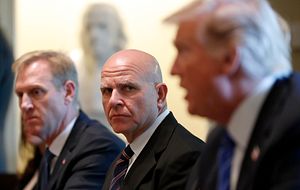Throughout 2017, I participated in a number of so-called Track II defense and national security meetings, where I had the opportunity to interact with national security experts, scholars, and former officials from a number of Asian and European countries.
Reflecting back on these discussions, what struck me most was the incessant persistent relevance of the decision to invade Iraq in 2003 and how it influences perceptions about the credibility and acumen of the U.S. “foreign policy establishment.”
I was particularly made aware of this during a Track II meeting on the nuclear standoff on the Korean Peninsula last summer.
Asian and European participants by and large did not separate the policies and verbal bellicosity of U.S. President Donald Trump from policy suggestions by the Republican and more hawkish Democratic foreign policy establishment as the majority of members in both groups supported the Iraq invasion of 2003. The usual argument I heard went something like this: They were all wrong about Iraq; how can they possibly be right about North Korea?
Indeed, as Kori Schake recently argued, the Trump White House is making many of the same arguments the George W. Bush administration made in the run-up to the 2003 Iraq War to justify military action on the Korean Peninsula.
Furthermore, Donald Trump’s foreign policy so far is fairly conventional and has not broken with that of his Democratic and Republican predecessors—Twitter outbursts notwithstanding. Whether on Afghanistan, North Korea, or Syria, Trump has largely stayed the course.
This perception of the continuity of U.S. foreign policy is amplified by the fact that just as a number of U.S. foreign and defense policy experts see Germany and Japan as monoliths so do Asian and European experts view the United States.
And to a certain degree they are right: There is broad bipartisan agreement by the U.S. foreign policy establishment on the fundamentals underpinning U.S. national security including the need for American leadership in the world backed up by the threat or use of military force.
Yet, while many in the U.S. foreign policy establishment see the continuation of conventional U.S. foreign policy as comforting allies and partners, the 2003 invasion of Iraq invokes opposite sentiments among a number of Asian and European experts I talked to: They fear unilateral American military action.
For better or worse, a number of experts abroad see supporters of the 2003 invasion as synonymous with what former U.S. President Barack Obama’s foreign-policy speechwriter Ben Rhodes called “the blob.”
This makes one wonder whether the U.S. foreign policy establishment will ever recover from their support to invade Iraq in 2003, or whether the United States has perhaps lost for good the voices of a generation of national security experts.
Put more succinctly, will backers of the 2003 Iraq War suffer the same fate as did policy makers supporting appeasement policies vis-à-vis Nazi Germany in France and Great Britain in the 1930s?
The reputation of proponents of appeasement, a large part of the French and British political establishment in the 1930s, never really recovered from their stance following the Second World War.
“You were wrong about Saddam/Hitler, why would you be right about Kim Jong Un/Nasser” may be a reductionist juxtaposition but nevertheless constitutes a simple but compelling reason not to accept advice from a backer of appeasement or the Iraq War.
Unlike the rest of the world, the U.S. foreign policy establishment has largely moved on from the Iraq War.
Those who supported it, admitted that they made a mistake, while simultaneously blaming the Bush administration for a jumbled execution of the war, which vicariously exculpated their own misguided assumptions to a point.
They also paid lip service to find means to better empathize with the enemy given that they acknowledged their failure to understand Middle Eastern societies. Yet, there are few signs that members of the foreign policy establishment in 2017 have learned their lessons.
Like similar institutions in other countries, the U.S. foreign policy elite is relatively small, homogenous, and insular. This makes criticism from outsiders especially hard to be heard and the loss of credibility outside the blob especially hard to grasp for some.
F. Scott Fitzgerald notes in Tender is the Night: “The change came a long way back, but at first it didn’t show. The manner remains intact for some time after the morale cracks.” The change for the foreign policy establishment may have happened all the way back in March 2003.
For many Asian and European experts I talked to this year, the 2003 invasion of Iraq was not an aberration but the culmination of a certain kind of traditional interventionist U.S. foreign policy, just as the election of Donald Trump was not a deviation from U.S. political tradition but a confirmation of a certain kind of U.S. exceptionalism.
Although there were many establishment figures who opposed the war in 2003, there is a palpable fear in Asia and Europe that when they have a choice, the majority of members of the U.S. foreign policy establishment prefer the use of military force to most other options.
Credibility is often mistaken for the willingness to use military force. Yet, it is ultimately not in the United States’ national interest to be seen as pursuing an overt militarized foreign policy—especially when it threatens to back nuclear-armed adversaries such as Kim Jong-Un into a corner.
































